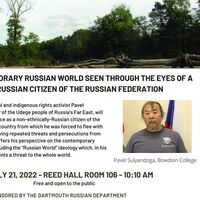The Contemporary Russian World Seen Through the Eyes of a Non-Russian Citizen
Political, environmental and indigenous rights activist Pavel Sulyandziga, a member of the Udege people of Russia's Far East
The Contemporary Russian World Seen Through the Eyes of a Non-Russian Citizen of the Russian Federation
Political, environmental and indigenous rights activist Pavel Sulyandziga, a member of the Udege people of Russia's Far East, will talk about his experience as a non-ethnically-Russian citizen of the Russian Federation (a country from which he was forced to flee with his family in 2017 following repeated threats and persecutions from the government). He offers his perspective on the contemporary moment in Russia, including the "Russian World" ideology which, in his view, currently represents a threat to the whole world.
Pavel Sulyandziga, of the Udege people, was born in Primorsky Kray, the easternmost region of what is now the Russian Federation; his home region is the Bikin River valley. During the late 1980s, Sulyandziga successfully mobilized his village of Krasny Yar against the administration's plans to grant timber harvesting licenses to a Soviet-Korean joint venture led by Hyundai. Since then, he has remained one of the most outspoken indigenous rights activists in the Russian Federation.
In 1991 Sulyandziga was elected as Chairman of the Indigenous Peoples Association of Primorskiy kray. He has participated in the preservation of biodiversity in the Bikin river valley, acted as Indigenous curator of a project for the preservation of the Ussuri Tiger, and between 1997-2000 he coordinated the Danish-Greenlandic Initiative for assistance to the indigenous peoples of Russia. Other international activity included participating in the Eurasian Club (Japan) on assistance to the education and preservation of culture of indigenous peoples; visiting Indian reservations in the USA (California, Oregon, Washington) to study their experience with education, culture and self-governance. From 2005 to 2010 he was a member of the United Nations Permanent Forum on Indigenous Issues.
He has been active in Russian political life: he was a councilor to the Governor of the Primorskiy kray on indigenous issues (1994-1997) and subsequently member of the Civic Chamber of the Russian Federation (2006 - 2014). He was also advisor to the president of RAIPON (Russian Association of Indigenous Peoples of the North, Siberia and the Far East). In 2016, he was nominated by the oppositional Yabloko party as a candidate for the State Duma. Beginning in 2014, Sulyandziga and his family began to be increasingly pressured by the Russian authorities, and in 2017 he requested and received political asylum in the United States. He currently lives in Maine.
Sulyandziga holds a PhD in economics; at the beginning of his career he taught mathematics at the secondary school and college level in Primorskiy kray, Russia (1984-1987). He has been a Visiting Scholar at Dartmouth College (2017) and Associate Researcher at Bowdoin College (presently). Today, he is Chairperson of the Board of the International Development Fund of Indigenous Peoples in Russia (BATANI) and a member of the UN Working Group on the issue of human rights and transnational corporations and other business enterprises. He co-edits the journal World of Indigenous Peoples - Living Arctic.
